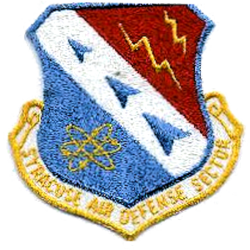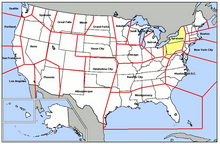The Syracuse Air Defense Sector (SADS) is an inactive United States Air Force organization. Its last assignment was with the Air Defense Command (ADC) 26th Air Division at Hancock Field, New York.
Syracuse Air Defense Sector
 | |
|---|---|
 Emblem of the Syracuse Air Defense Sector | |
| Active | 1956–1963 |
| Country | United States |
| Branch | |
| Role | Air Defense |
| Part of | Air Defense Command |

SADS was established in October 1956 as the 4624th Air Defense Wing, SAGE at Syracuse Air Force Station (AFS), New York, assuming control of former ADC Eastern Air Defense Force units primarily in western New York, most of Pennsylvania and a small portion of western Maryland and eastern West Virginia.[1] It controlled several aircraft and radar squadrons.
On 15 August 1958 the new Semi Automatic Ground Environment (SAGE) Direction Center (DC-03) and Combat Center (CC-01) became operational. 43°07′19″N 076°06′01″W / 43.12194°N 76.10028°W DC-03 was equipped with dual AN/FSQ-7 Computers. The day-to-day operations of the command were to train and maintain tactical units flying jet interceptor aircraft (F-89 Scorpion, F-101 Voodoo, F-102 Delta Dagger) and operating radars and interceptor missiles (CIM-10 Bomarc)in a state of readiness with training missions and a series of exercises with Strategic Air Command and other units simulating interceptions of incoming enemy aircraft. In early 1958, Syracuse AFS was renamed Hancock Field.
The Sector was inactivated on 4 September 1963 when the 26th Air Division headquarters moved to Hancock Field and the Syracuse Sector, in a realignment of sector boundaries, merged with the Boston Air Defense Sector.
Lineage
edit- Designated as 4624th Air Defense Wing, SAGE and organized on 1 October 1956
- Redesignated Syracuse Air Defense Sector on 8 January 1957
- Inactivated on 4 September 1963
Assignments
edit- 32nd Air Division, 1 October 1956
- 26th Air Division, 15 August 1958 – 4 September 1963
Stations
edit- Syracuse AFS, (later Hancock Field) New York, 1 October 1956 – 4 September 1963
Components
edit- 15th Fighter Group (Air Defense)[2]
- Niagara Falls Municipal Airport, New York, 1 September 1958 – 1 July 1960
- Griffiss AFB, New York, 1 August 1959 – 4 September 1963
- 35th Air Defense Missile Squadron (BOMARC)[5]
- Niagara Falls Air Force Missile Site, New York, 1 June 1960 – 4 September 1963
Radar Squadrons
edit
|
|
Weapons Systems
edit- F-89J, 1959-1959
- F-101B, 1959-1963
- F-102A, 1958-1960
- IM-99 (later CIM-10), 1960-1963
See also
editNotes
edit- ^ Cornett, Lloyd H; Johnson, Mildred W (1980). A Handbook of Aerospace Defense Organization, 1946-1980 (PDF). Peterson AFB, CO: Office of History, Aerospace Defense Center. p. 37 (Map).
- ^ Factsheet, 15th Air Base Wing Archived 2014-04-22 at the Wayback Machine (accessed 5 Feb 2012)
- ^ Maurer, Maurer, ed. (1982) [1969]. Combat Squadrons of the Air Force, World War II (PDF) (reprint ed.). Washington, DC: Office of Air Force History. p. 213. ISBN 0-405-12194-6.
- ^ Factsheet, 49th Fighter Training Squadron Archived 2016-03-03 at the Wayback Machine (accessed 5 Feb 2012)]
- ^ Cornett & Johnson, p. 150
- ^ a b c Cornett & Johnson, pp. 156-58
- ^ a b Cornett & Johnson, pp. 165-67
References
edit| External image | |
|---|---|
| SAGE facilities |
This article incorporates public domain material from the Air Force Historical Research Agency
- Leonard, Barry (2009). History of Strategic Air and Ballistic Missile Defense (PDF). Vol. II, 1955–1972. Fort McNair, DC: Center for Military History. ISBN 9781437921311.
- Redmond, Kent C.; Smith, Thomas M. (2000). From Whirlwind to MITRE: The R&D Story of The SAGE Air Defense Computer. Cambridge, MA: MIT Press. ISBN 978-0-262-18201-0.
- Winkler, David F.; Webster, Julie L (1997). Searching the skies: The legacy of the United States Cold War Defense Radar Program. Champaign, IL: US Army Construction Engineering Research Laboratories. LCCN 97020912.[dead link]* Radomes.org Syracuse Air Defense Sector